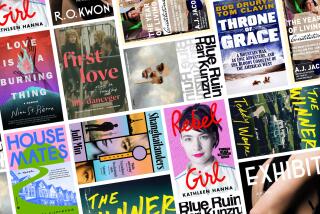Two Epics for the Long Holiday Drive
- Share via
Driving all day so you can share turkey and table talk with your relatives? If you crave a meaty story to keep you awake, remember that John Steinbeck wrote one of the best road books of all time. True, “The Grapes of Wrath” is a somber tale, but it will provide you with a most intellectually stimulating car ride. (Penguin Audio; unabridged fiction; 12 cassettes; 21 hours; $49.95; read by Dylan Baker.)
Even if you read this in high school, it is worth revisiting the Joads as they travel from their small farm in Oklahoma to California during the Depression. Sharecroppers thrown off the land by a new breed of agro-businessmen, they fall into the line of starving and weary families who hope to find work in the fertile valleys of Southern California.
Their place in the world, the solace of family life, even the basic ability to eat is all removed from their grasp once they lose their farm. Written with enormous sensitivity and heartbreaking detail, this Pulitzer Prize-winning epic is as vibrant and mesmerizing as when first written. It is the first in a series of Steinbeck’s greatest novels released unabridged by Penguin Audio, to be followed by “Tortilla Flat” and “The Long Valley.”
If one is to spend 21 hours listening to a reader, be thankful it is Dylan Baker. Though his delivery is not flawless, it is close. He reads the narrative text without an accent, but adds a flat, rural sound to his voice for dialogue. His sincere performance captures the heartfelt emotion of people watching their world crumble. He is also blessed with a rich, resonant voice that pulls us into the story and keeps us there. The male characters all sound quite different. Some have deeper voices than others, a few sound world-weary, while others are gruff or kindly.
All are believable. Such is not the case for the women.
Baker apparently ran out of ideas for the various smaller characters, and his reach missed its mark. Many of the women are so overly broad they become vocal caricatures. Unconvincing and silly, these glitches in his performance interfere with the story’s flow in an otherwise excellent narration.
High production values also enhance this audio. Doleful harmonica music is used to separate sections and Baker’s pace is perfectly suited to the material. Had the producer kept tighter control of his performance, this would have been the best audio of 1998.
Another epic that begins at about the same time as Steinbeck’s family saga, Arthur Golden’s “Memoirs of a Geisha” takes us into the tearooms and private quarters of a young Japanese woman. (Random House Audio; unabridged fiction; 11 cassettes; 18 hours; $46.95; read by Bernadette Dunne.)
It is difficult to believe a middle-aged American male wrote this sensitive and richly descriptive account of a gray-eyed geisha.
Virtually sold by her father, she was attractive enough to be apprenticed into this ancient profession, while her less handsome sister was forced into prostitution. Westerners often believe geishas were high-class courtesans, but these women were actually trained as artists who entertained in teahouses and at parties. Though many became the mistresses to wealthy men, they were closer to trophy wives than back-alley girlfriends. Golden steps into this world and tears down the rice paper walls with an emotional dexterity and descriptive prowess that is positively poetic.
The plot follows Nitta Sayuri from her ragtag days as a child in a backwater fishing village to her rise as one of Japan’s most celebrated geishas. Inspired by a true story, Golden so infuses it with all things Asian that we feel as if we have visited another culture. But after spending hours listening to this woman learn the politics of entertainment and the skills needed to survive World War II, her romance with a kindly business executive is given short shrift.
The same is true of her final days in New York City. Golden, who spent nearly a decade working on this book, could certainly have maintained our rapt attention for another couple of hours with a more detailed denouement. Bernadette Dunne reads this clearly and prettily, but one cannot stop wishing an Asian woman had been employed for the task. Her Japanese inflection sounds just fine to these Occidental ears, and she adopts subtle changes in her tone and manner for various characters. Dunne’s soft-spoken approach suits this material, and her delivery is professional and engaging. However, her voice is so unremarkable it is almost bland, whereas an Asian actress would have given this an edge of reality.
This audio was originally released in a severely abridged format. Do not bother with that version, as it lacks the nuance and subtext of this recently released edition.
*
Rochelle O’Gorman reviews audio books every other week. Next week: Margo Kaufman on mystery books.
More to Read
Sign up for our Book Club newsletter
Get the latest news, events and more from the Los Angeles Times Book Club, and help us get L.A. reading and talking.
You may occasionally receive promotional content from the Los Angeles Times.










